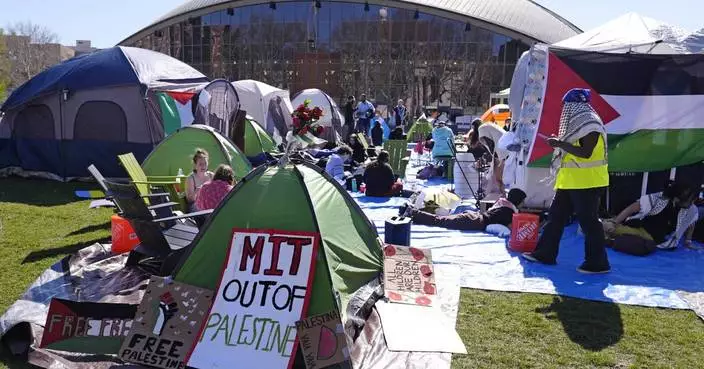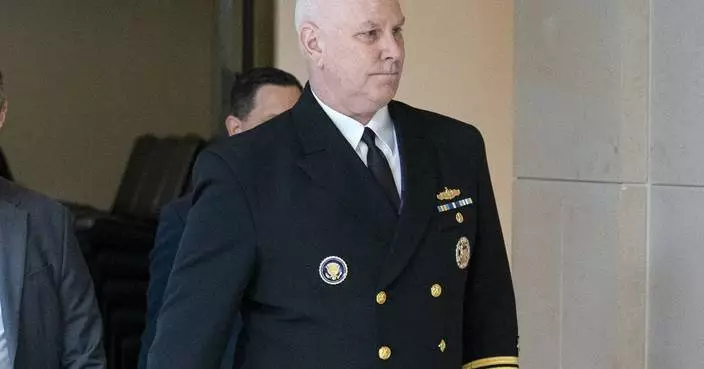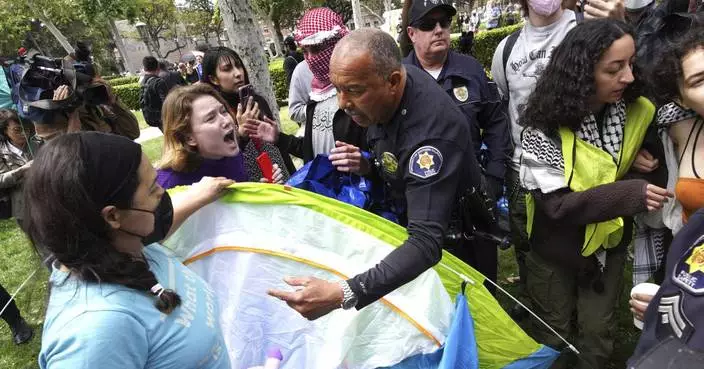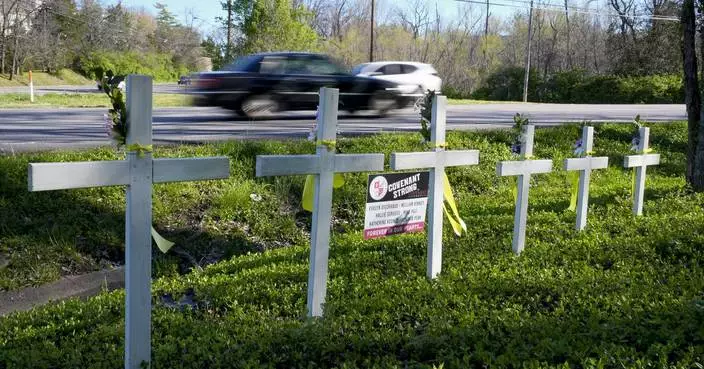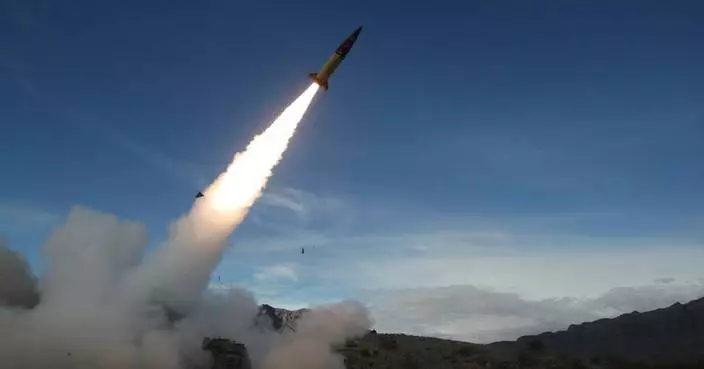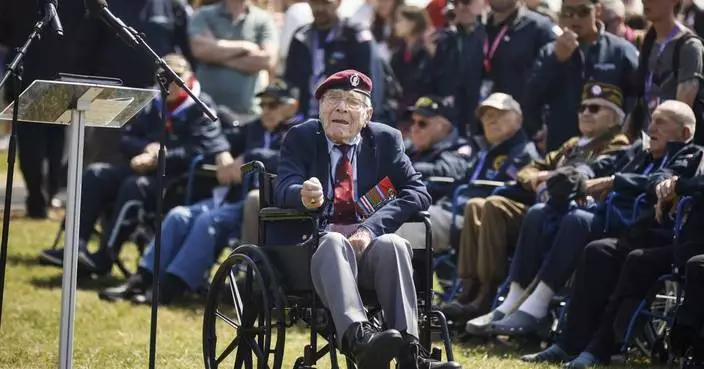The Western airstrikes targeting suspected Syrian chemical weapons facilities might have rained down punishment from the sky, but they will not fundamentally degrade a war machine whose main bases, weaponry and personnel remain in place.
As a symbol, they might reflect the inability to prevent President Bashar Assad from marching toward a professed victory in the civil war — still denying he ever even used banned substances, and perhaps not even needing them.
Click to Gallery
The Western airstrikes targeting suspected Syrian chemical weapons facilities might have rained down punishment from the sky, but they will not fundamentally degrade a war machine whose main bases, weaponry and personnel remain in place.
Firefighrers extinguish smoke that rises from the damage of the Syrian Scientific Research Center which was attacked by U.S., British and French military strikes to punish President Bashar Assad for suspected chemical attack against civilians, in Barzeh, near Damascus, Syria, Saturday, April 14, 2018. (AP Photo/Hassan Ammar)
Any opposition expectations that the airstrikes might try to destroy or degrade Assad's lethal air power or target bases where his warplanes and helicopters begin their bombing missions were quickly dashed: The U.S., British and French precision attacks only singled out Assad's alleged chemical weapons capabilities.
A Syrian soldier films the damage of the Syrian Scientific Research Center which was attacked by U.S., British and French military strikes to punish President Bashar Assad for suspected chemical attack against civilians, in Barzeh, near Damascus, Syria, Saturday, April 14, 2018. (AP Photo/Hassan Ammar)
More pertinently, the Syrian army declared the battered town of Douma "fully liberated" after the last group of rebels left. Douma was the site of the suspected April 7 chemical weapons attack and also the last rebel-held town in the eastern Ghouta region that was once a sprawling rebel-held bastion at the doors of the capital. Thousands of hard-line rebels capitulated in Douma following years of siege and an air and ground campaign that killed hundreds in recent weeks.
A fireman extinguishes smoke that rises from the damage of the Syrian Scientific Research Center which was attacked by U.S., British and French military strikes to punish President Bashar Assad for suspected chemical attack against civilians, in Barzeh, near Damascus, Syria, Saturday, April 14, 2018. (AP Photo/Hassan Ammar)
Despite Syria's commitment to abolish its program in 2013, U.S. officials say it is "highly likely" that Assad kept a hidden, undisclosed stockpile. They say information gathered from recent alleged attacks also suggest Assad retained a "continued production capacity" — also banned under the 2013 deal.
Syrian soldiers hold their weapons as they dance and chant slogans against U.S. President Trump during demonstrations following a wave of U.S., British and French military strikes to punish President Bashar Assad for suspected chemical attack against civilians, in Damascus, Syria, Saturday, April 14, 2018. (AP Photo/Hassan Ammar)
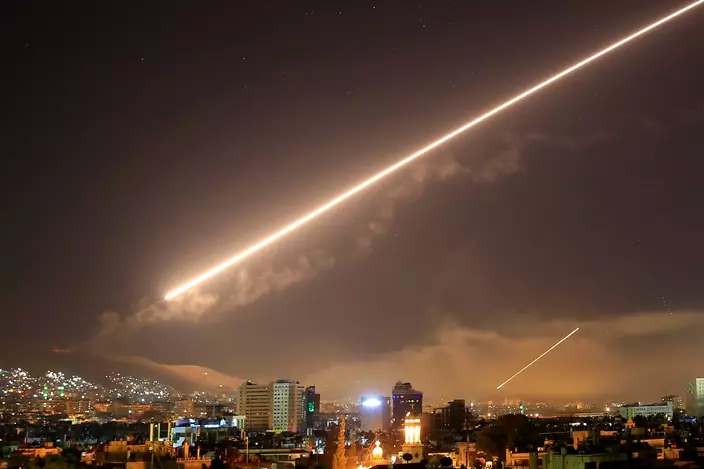
Damascus skies erupt with surface to air missile fire as the U.S. launches an attack on Syria targeting different parts of the Syrian capital Damascus, Syria, early Saturday, April 14, 2018. Syria's capital has been rocked by loud explosions that lit up the sky with heavy smoke as U.S. President Donald Trump announced airstrikes in retaliation for the country's alleged use of chemical weapons. (AP Photo/Hassan Ammar)
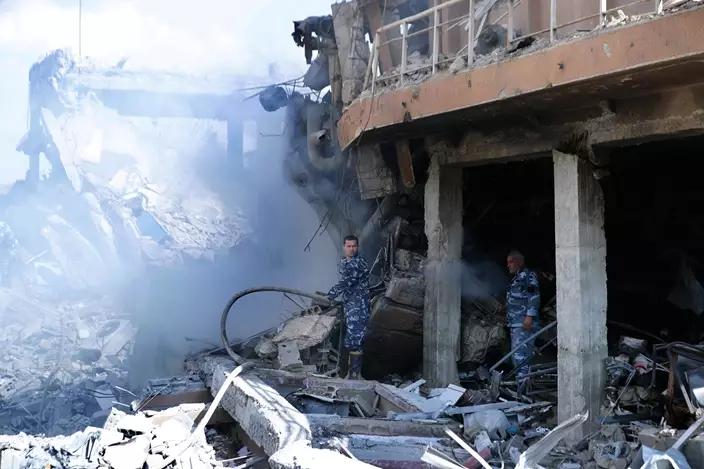
Firefighrers extinguish smoke that rises from the damage of the Syrian Scientific Research Center which was attacked by U.S., British and French military strikes to punish President Bashar Assad for suspected chemical attack against civilians, in Barzeh, near Damascus, Syria, Saturday, April 14, 2018. (AP Photo/Hassan Ammar)
Any opposition expectations that the airstrikes might try to destroy or degrade Assad's lethal air power or target bases where his warplanes and helicopters begin their bombing missions were quickly dashed: The U.S., British and French precision attacks only singled out Assad's alleged chemical weapons capabilities.
The Pentagon said the strikes targeted three facilities — a scientific research center in the Damascus area, allegedly linked to the production and testing of chemical and biological warfare technology; a chemical weapons storage facility west of Homs; and a chemical weapons equipment storage facility and key command post, also west of Homs.
"If this is it, Assad should be relieved," Randa Slim, an expert with the Washington-based Middle East Institute, wrote on Twitter.
For Assad, it was business as usual Saturday — or so his office sought to portray it, posting a short video of him walking into work, briefcase in hand.
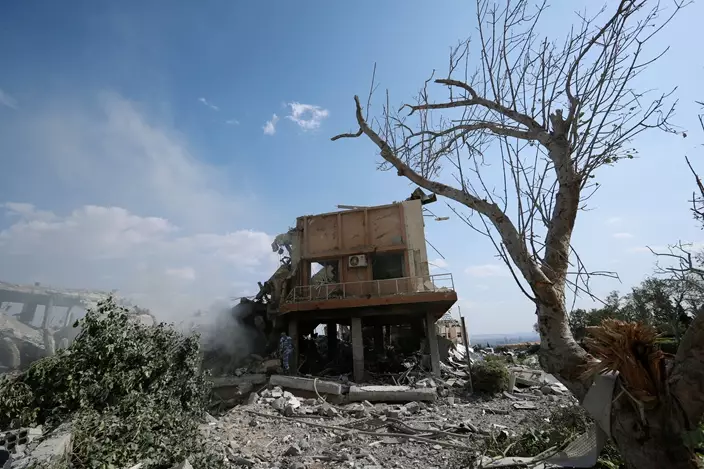
A fireman extinguishes smoke that rises from the damage of the Syrian Scientific Research Center which was attacked by U.S., British and French military strikes to punish President Bashar Assad for suspected chemical attack against civilians, in Barzeh, near Damascus, Syria, Saturday, April 14, 2018. (AP Photo/Hassan Ammar)
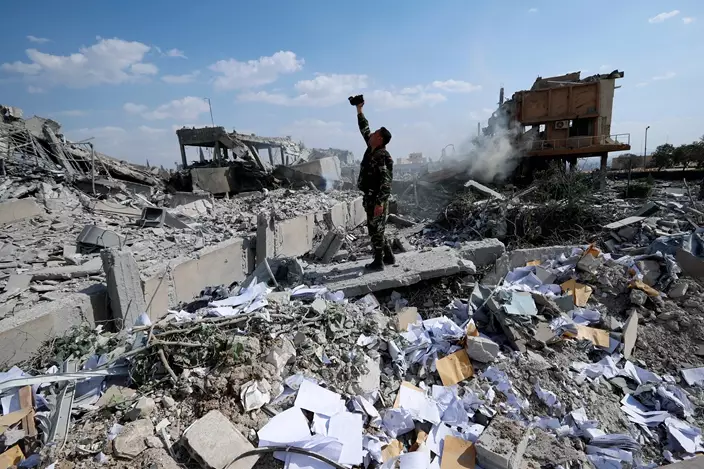
A Syrian soldier films the damage of the Syrian Scientific Research Center which was attacked by U.S., British and French military strikes to punish President Bashar Assad for suspected chemical attack against civilians, in Barzeh, near Damascus, Syria, Saturday, April 14, 2018. (AP Photo/Hassan Ammar)
More pertinently, the Syrian army declared the battered town of Douma "fully liberated" after the last group of rebels left. Douma was the site of the suspected April 7 chemical weapons attack and also the last rebel-held town in the eastern Ghouta region that was once a sprawling rebel-held bastion at the doors of the capital. Thousands of hard-line rebels capitulated in Douma following years of siege and an air and ground campaign that killed hundreds in recent weeks.
The recapture of Douma effectively ends a nearly seven-year rebellion near Damascus and marks Assad's most significant victory since his forces retook the northern city of Aleppo in late 2016. With seemingly open-ended support from allies Russia and Iran, the Syrian military will most definitely turn its attention to remaining opposition-held territory, namely in the south and the northern province of Idlib.
Assad has already consolidated control over most of Syria and its major population centers. His allies have questioned the rationale of a victor needing to resort to chemical weapons that bring global condemnation and risk punitive action.
The seemingly limited airstrikes came as a disappointment to Syria's opposition, with one rebel spokesman labeling them a "farce." Another senior opposition figure, Nasr Hariri, said the attacks were welcome but only reinforced the message that while it is not OK to use chemical weapons, the government can continue to "use explosive barrels and cluster bombs" with impunity.
Assad's chemical weapons capabilities — and exactly what was hit Saturday — remain shrouded in mystery.
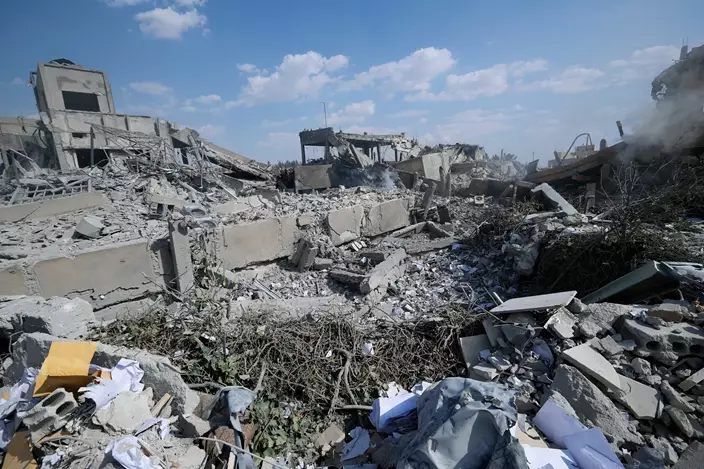
Debris surround the Syrian Scientific Research Center which was attacked by U.S., British and French military strikes to punish President Bashar Assad for suspected chemical attack against civilians, in Barzeh, near Damascus, Syria, Saturday, April 14, 2018.(AP Photo/Hassan Ammar)
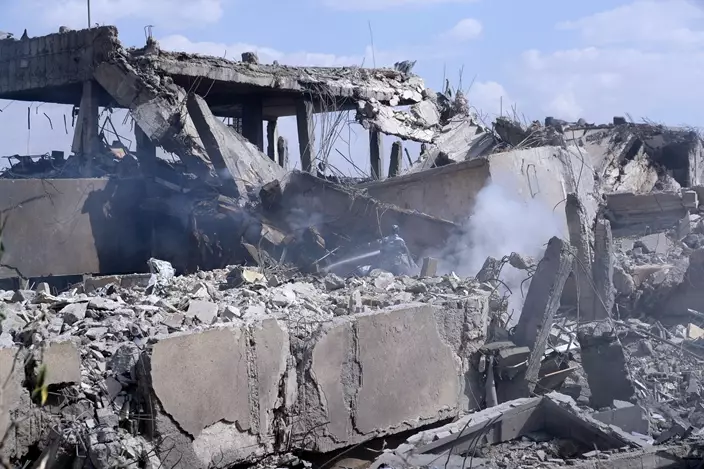
A fireman extinguishes smoke that rises from the damage of the Syrian Scientific Research Center which was attacked by U.S., British and French military strikes to punish President Bashar Assad for suspected chemical attack against civilians, in Barzeh, near Damascus, Syria, Saturday, April 14, 2018. (AP Photo/Hassan Ammar)
Despite Syria's commitment to abolish its program in 2013, U.S. officials say it is "highly likely" that Assad kept a hidden, undisclosed stockpile. They say information gathered from recent alleged attacks also suggest Assad retained a "continued production capacity" — also banned under the 2013 deal.
The government certainly had enough advance notice. Syria war monitors said the military emptied air bases and moved equipment before the strikes.
The Pentagon said Saturday that it believes the airstrikes "attacked the heart of the Syrian chemical weapons program," significantly degrading Syria's ability to use such weapons again. Russian officials said the damage was minimal, maintaining that all key air bases were intact and the purported chemical weapons facilities had been abandoned long ago.
Capt. Adulsalam Abdulrazek, a former officer in Syria's chemical program, said the overnight strikes probably hit "parts of, but not the heart" of the operation.
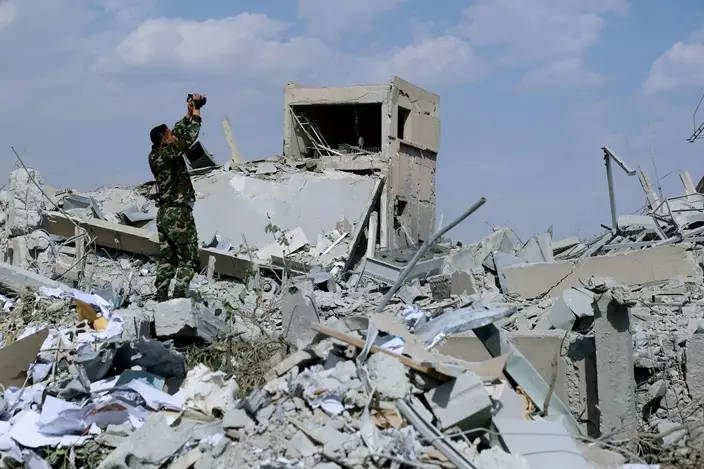
A Syrian soldier films the damage of the Syrian Scientific Research Center which was attacked by U.S., British and French military strikes to punish President Bashar Assad for suspected chemical attack against civilians, in Barzeh, near Damascus, Syria, Saturday, April 14, 2018. (AP Photo/Hassan Ammar)
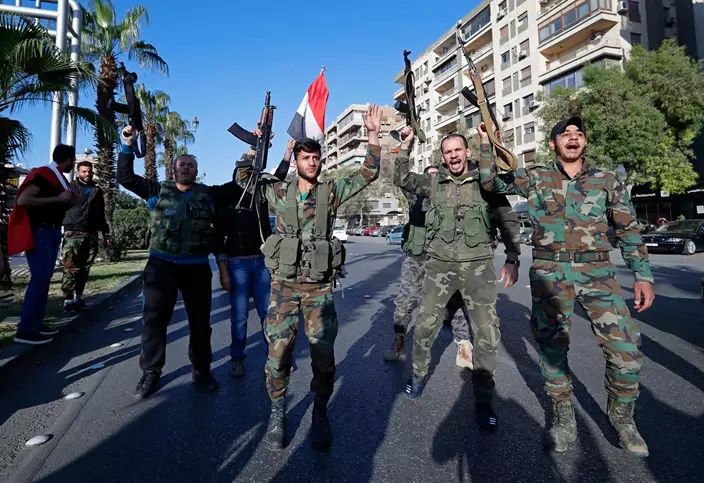
Syrian soldiers hold their weapons as they dance and chant slogans against U.S. President Trump during demonstrations following a wave of U.S., British and French military strikes to punish President Bashar Assad for suspected chemical attack against civilians, in Damascus, Syria, Saturday, April 14, 2018. (AP Photo/Hassan Ammar)
Speaking to The Associated Press from rebel-held northern Syria, he said they were unlikely to curb the government's ability to produce such weapons or launch new attacks.
Abdulrazek defected from the program in 2012, when he was based in eastern Ghouta, the suburb hit by a chemical attack in 2013 and allegedly again on April 7.
He said there were an estimated 50 warehouses storing chemical weapons before the program was dismantled in 2013. He said he believes those fixed storage facilities, mostly in rural areas, are intact or only slightly dispersed, and that the program was only partly dismantled because Damascus didn't allow inspections.
IHS Jane's expert Karl Dewey, said the scientific research facility on the northeastern edge of Damascus is thought to have integrated chemical payloads onto artillery.
It is one of at least three sites that have been consistently referenced in association with Syria's chemical weapons program, including Masyaf and Dummar, also known as Jamraya, both reported to have been hit by Israeli strikes last year.
Whatever the rationale for using chemical weapons, even Assad's most persistent detractors agree he does not need them at this point in the war.
The airstrikes are unlikely to have any real impact on the outcome of the civil war, nor will they serve to bring Assad to the negotiating table to seriously discuss a political settlement, as many hoped.
"Will this deter Assad from using chemical weapons again? Possibly, not least because he's essentially won the war anyway," wrote Faysal Itani, resident senior fellow in the Atlantic Council's Rafik Hariri Center for the Middle East.
"Will it change anything else? For better or worse, no."
AUSTIN, Texas (AP) — With graduations looming, student protesters doubled down early Thursday on their discontent of the Israel-Hamas war on campuses across the country as universities, including ones in California and Texas, have become quick to call in the police to end the demonstrations and make arrests.
While grappling with growing protests from coast to coast, schools have the added pressure of May commencement ceremonies. At Columbia University in New York, students defiantly erected an encampment where many are set to graduate in front of families in just a few weeks.
Columbia continued to negotiate with students after several failed attempts — and over 100 arrests — to clear the encampment, but several universities ousted demonstrators Wednesday, swiftly turning to law enforcement when protests bubbled up on their campuses.
Police peacefully arrested student protesters at the University of Southern California, hours after officers at the University of Texas at Austin aggressively detained dozens in the latest clashes between law enforcement and those protesting the Israel-Hamas war on campuses nationwide.
Tensions were already high at USC after the university canceled a planned commencement speech by the school’s valedictorian, who publicly supports Palestine, citing safety concerns. After scuffles with police early Wednesday, a few dozen demonstrators standing in a circle with locked arms were detained one by one without incident later in the evening.
Officers encircled the dwindling group sitting in defiance of an earlier warning to disperse or be arrested. Beyond the police line, hundreds of onlookers watched as helicopters buzzed overhead. The school closed the campus.
Hours earlier in Texas, hundreds of local and state police — including some on horseback and holding batons — bulldozed into protesters, at one point sending some tumbling into the street. Officers pushed their way into the crowd and made 34 arrests at the behest of the university and Texas Gov. Gregg Abbott, according to the state Department of Public Safety.
A photographer covering the demonstration for Fox 7 Austin was in the push-and-pull when an officer yanked him backward to the ground, video shows. The station confirmed that the photographer was arrested. A longtime Texas journalist was knocked down in the mayhem and could be seen bleeding before police helped him to emergency medical staff.
Dane Urquhart, a third-year Texas student, called the police presence and arrests an “overreaction," adding that the protest “would have stayed peaceful” if the officers had not turned out in force.
“Because of all the arrests, I think a lot more (demonstrations) are going to happen,” Urquhart said.
Police left after hours of efforts to control the crowd, and about 300 demonstrators moved back in to sit on the grass and chant under the school's iconic clock tower.
In a statement Wednesday night, the university's president, Jay Hartzell, said: “Our rules matter, and they will be enforced. Our University will not be occupied."
North of USC, students at California State Polytechnic University, Humboldt, were barricaded inside a building for a third day, and the school shut down campus through the weekend and made classes virtual.
Harvard University in Massachusetts had sought to stay ahead of protests this week by limiting access to Harvard Yard and requiring permission for tents and tables. That didn't stop protesters from setting up a camp with 14 tents Wednesday following a rally against the university’s suspension of the Harvard Undergraduate Palestine Solidarity Committee.
Students protesting the Israel-Hamas war are demanding schools cut financial ties to Israel and divest from companies enabling its monthslong conflict. Some Jewish students say the protests have veered into antisemitism and made them afraid to set foot on campus as graduation nears, partly prompting a heavier hand from universities.
At New York University this week, police said 133 protesters were taken into custody, while over 40 protesters were arrested Monday at an encampment at Yale University.
Columbia University averted another confrontation between students and police earlier Wednesday. University President Minouche Shafik had set on Tuesday a midnight deadline to reach an agreement on clearing an encampment, but the school extended negotiations for another 48 hours.
On a visit to campus Wednesday, U.S. House Speaker Mike Johnson, a Republican, called on Shafik to resign “if she cannot bring order to this chaos.”
“If this is not contained quickly and if these threats and intimidation are not stopped, there is an appropriate time for the National Guard,” he said.
On Wednesday evening, a Columbia spokesperson said rumors that the university had threatened to bring in the National Guard were unfounded. “Our focus is to restore order, and if we can get there through dialogue, we will,” said Ben Chang, Columbia’s vice president for communications.
Columbia graduate student Omer Lubaton Granot, who put up pictures of Israeli hostages near the encampment, said he wanted to remind people that there were more than 100 hostages still being held by Hamas.
“I see all the people behind me advocating for human rights," he said. “I don’t think they have one word to say about the fact that people their age, that were kidnapped from their homes or from a music festival in Israel, are held by a terror organization.”
Harvard law student Tala Alfoqaha, who is Palestinian, said she and other protesters want more transparency from the university.
“My hope is that the Harvard administration listens to what its students have been asking for all year, which is divestment, disclosure and dropping any sort of charges against students,” she said.
On Wednesday about 60 tents remained at the Columbia encampment, which appeared calm. Security remained tight around campus, with identification required and police setting up metal barricades.
Columbia said it had agreed with protest representatives that only students would remain at the encampment and they would make it welcoming, banning discriminatory or harassing language.
Perry reported from Meredith, New Hampshire. Contributing to this report were Associated Press journalists in various locations including Joey Cappelletti, Will Weissert, Larry Lage, Steve LeBlanc, Dave Collins, Jim Salter, Haven Daley, Jesse Bedayn, John Antczak, Julie Walker and Joseph Krauss.
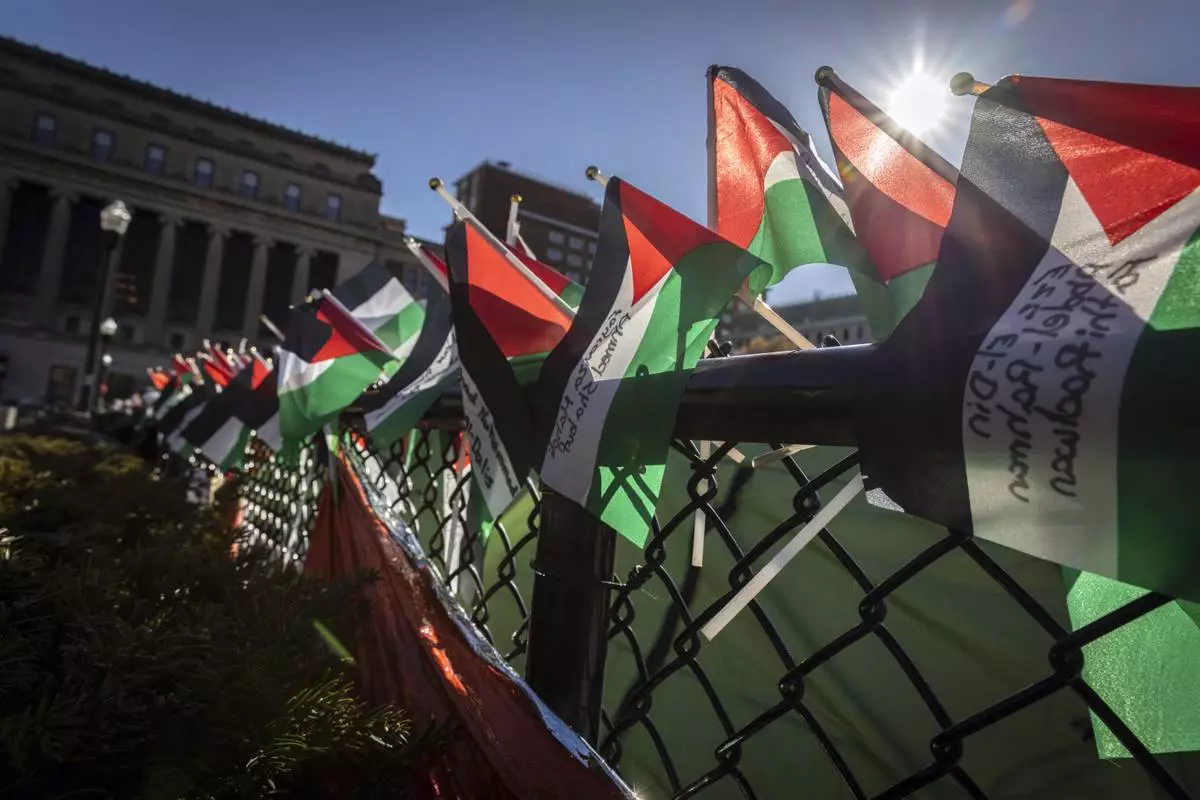
A row of Palestinian flags are seen on the fence at the pro-Palestinians demonstration encampment at Columbia University in New York on Wednesday April 24, 2024. (AP Photo/Stefan Jeremiah)
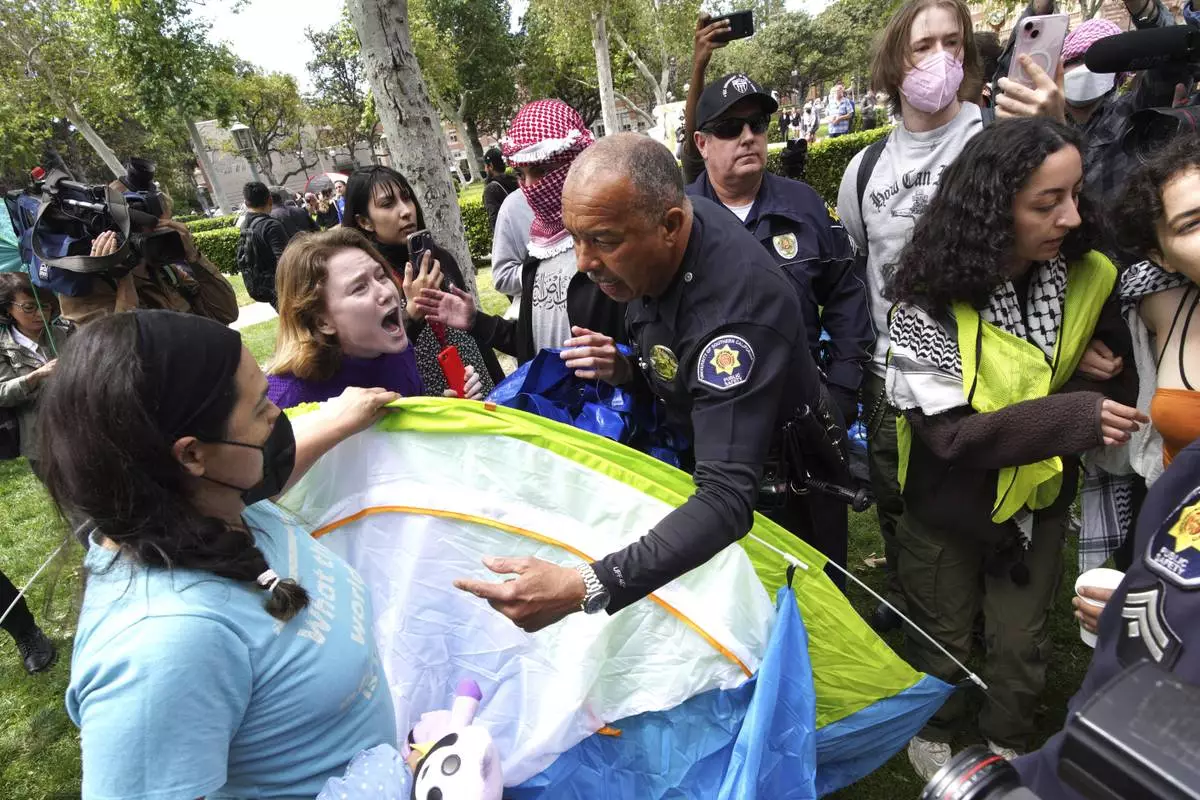
University of Southern California protesters fight with University Public Safety officers as they try to remove tents at the campus' Alumni Park during a pro-Palestinian occupation on Wednesday, April 24, 2024 in Los Angeles. (AP Photo/Richard Vogel)
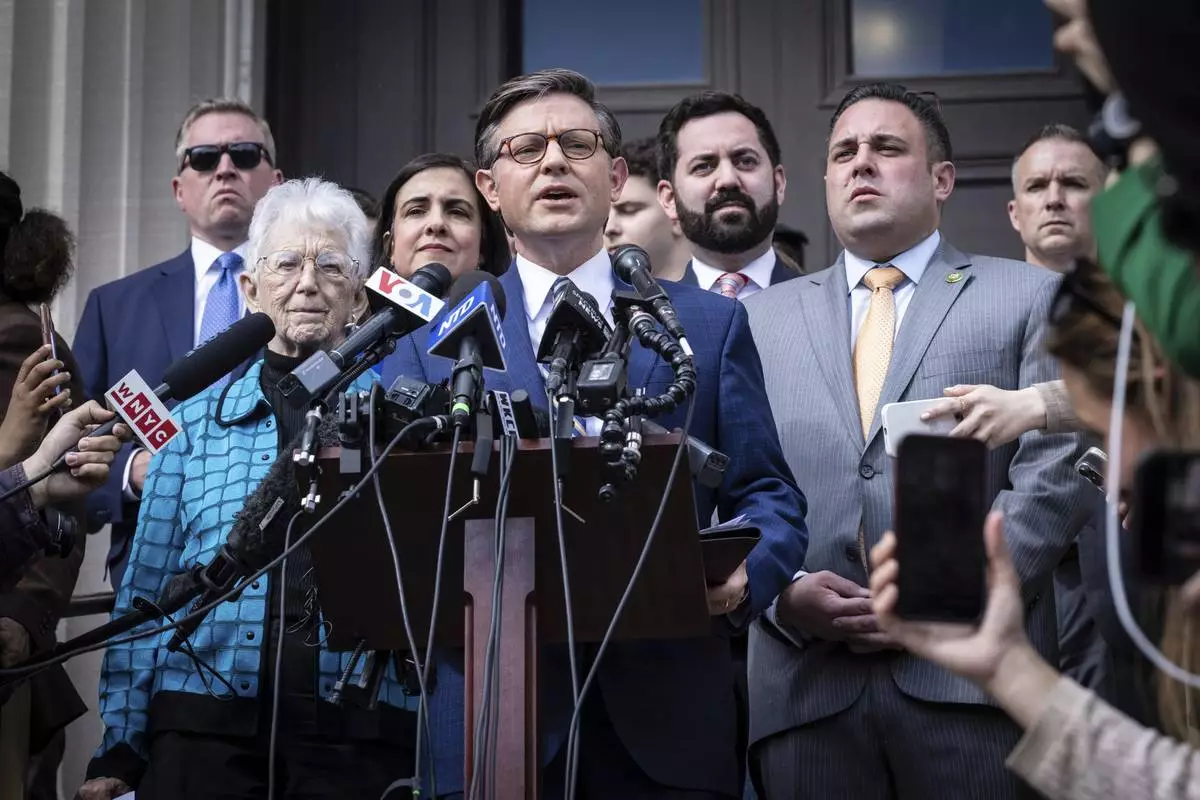
Speaker of the House Mike Johnson (R-LA) speaks to the media on the Lower Library steps on Columbia University's campus in New York on Wednesday April 24, 2024. (AP Photo/Stefan Jeremiah)
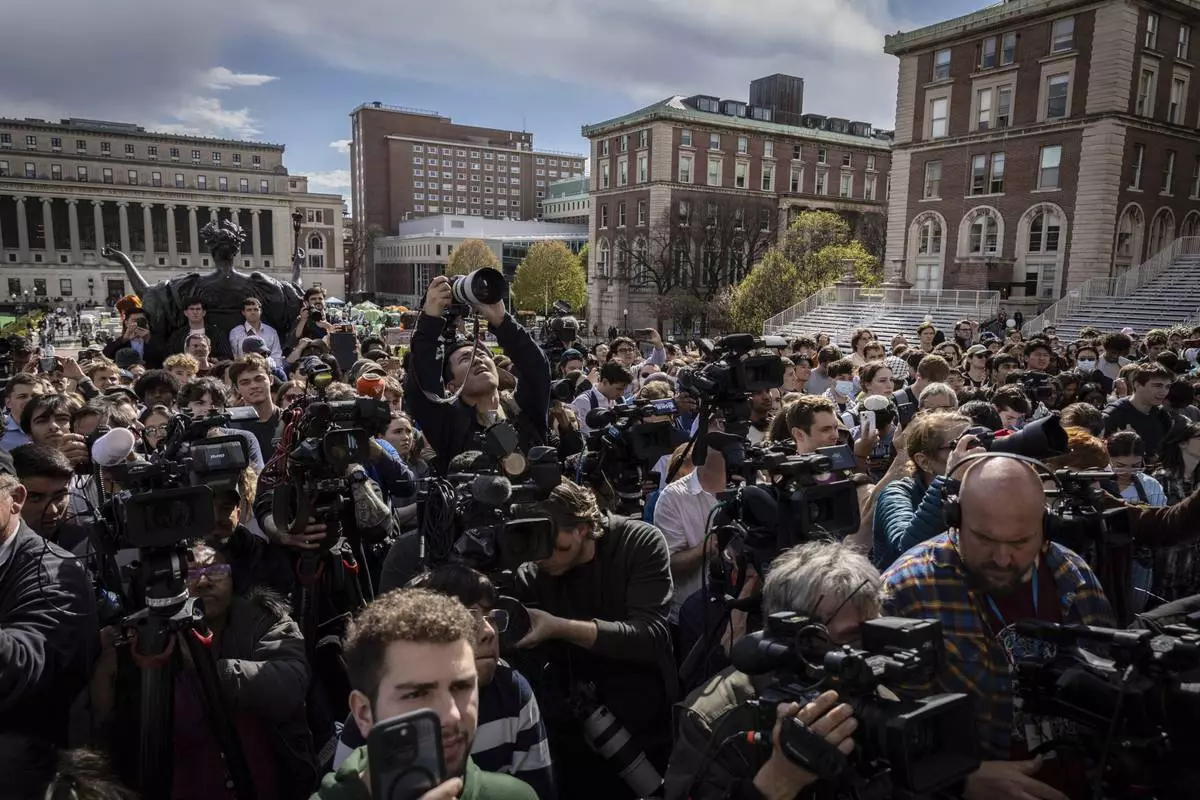
Students and press look on as Speaker of the House Mike Johnson, R-La., speaks to the media on the Lower Library steps on Columbia University's campus in New York, on Wednesday, April 24, 2024. (AP Photo/Stefan Jeremiah)
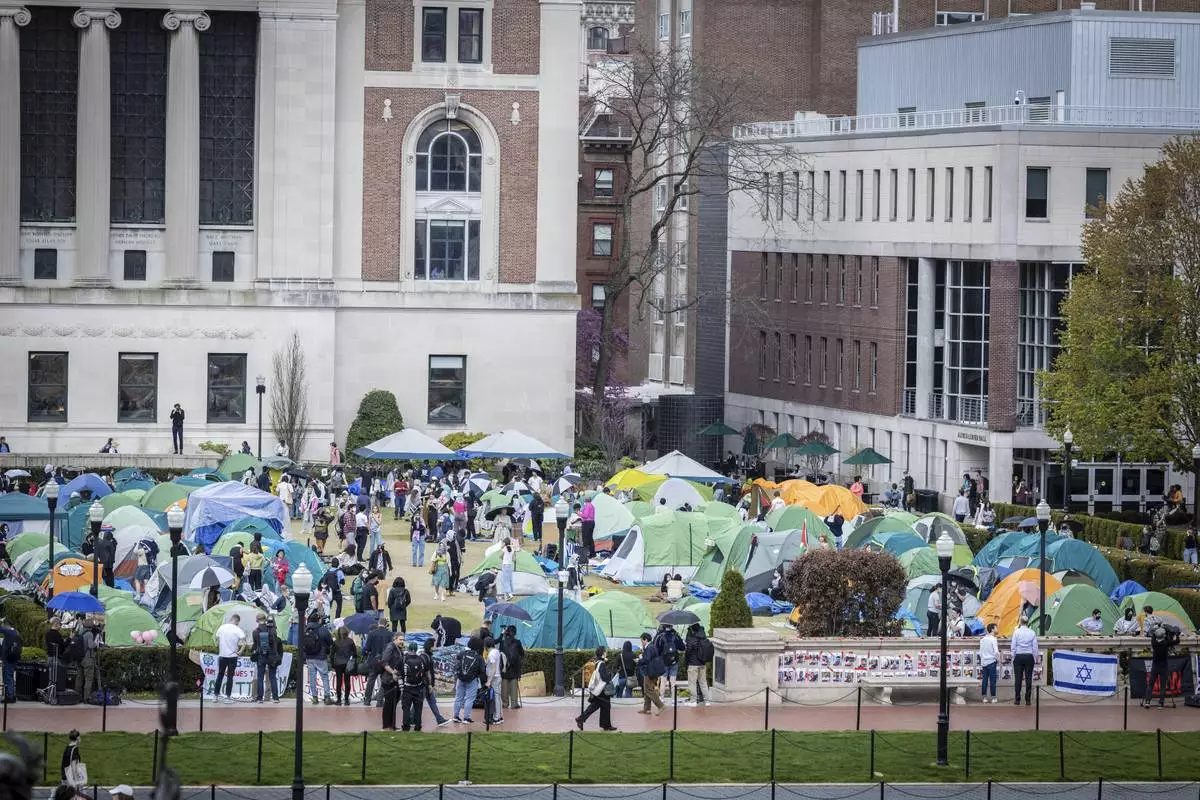
Tents erected at the pro-Palestinian demonstration encampment at Columbia University in New York, on Wednesday, April 24, 2024. (AP Photo/Stefan Jeremiah)
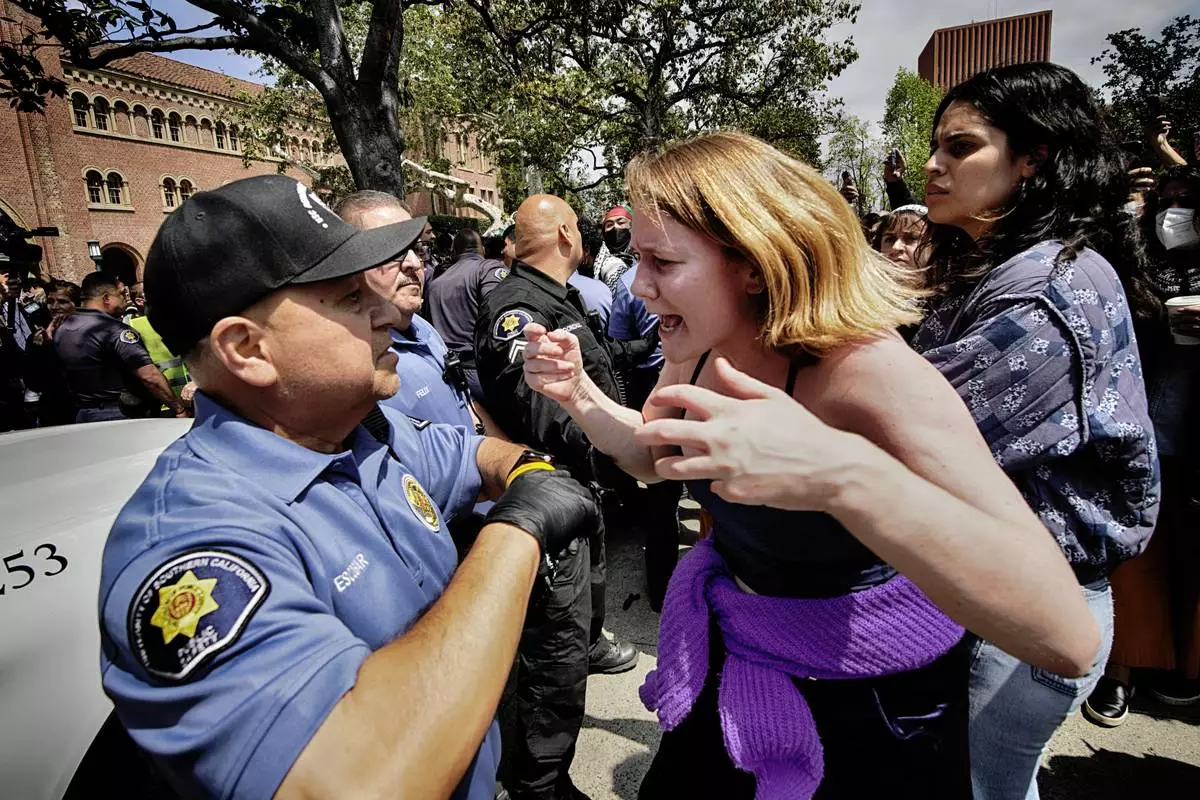
A University of Southern California protester, right, confronts a University Public Safety officer at the campus' Alumni Park during a pro-Palestinian occupation on Wednesday, April 24, 2024, in Los Angeles. (AP Photo/Richard Vogel)
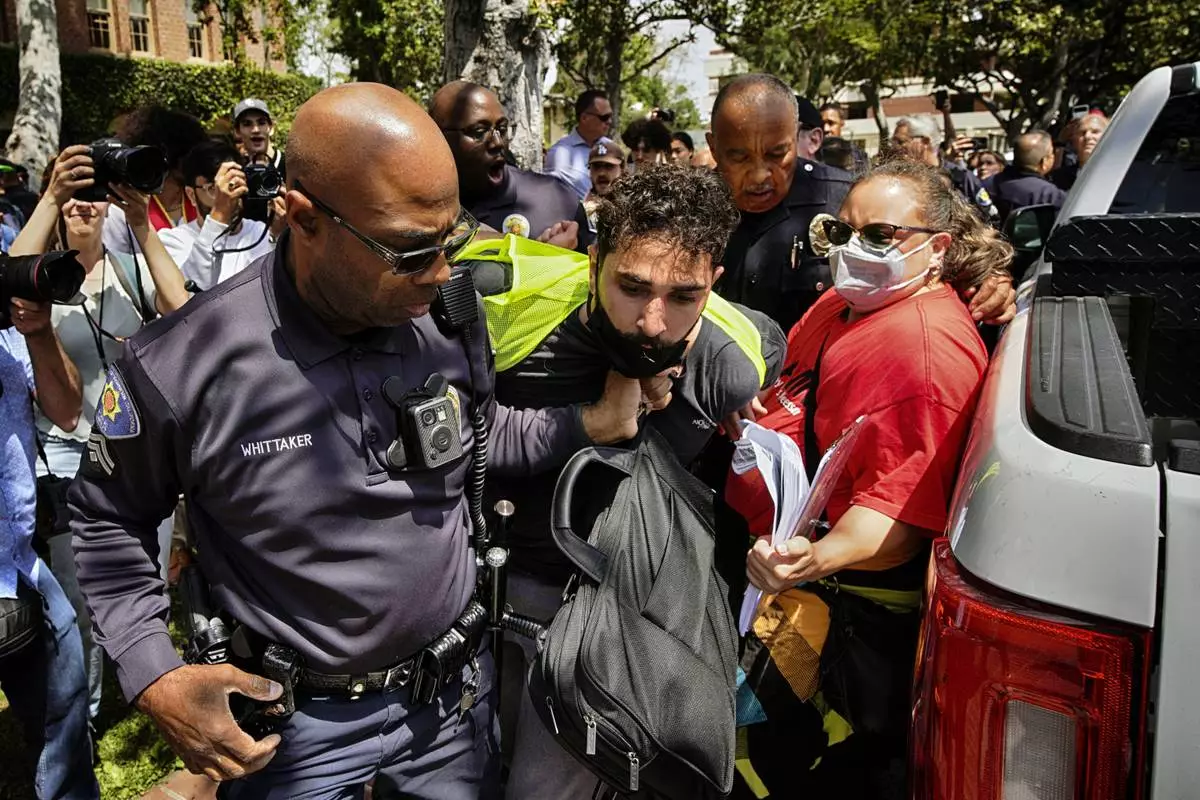
A University of Southern California protester is detained by USC Department of Public Safety officers during a pro-Palestinian occupation at the campus' Alumni Park on Wednesday, April 24, 2024, in Los Angeles. (AP Photo/Richard Vogel)
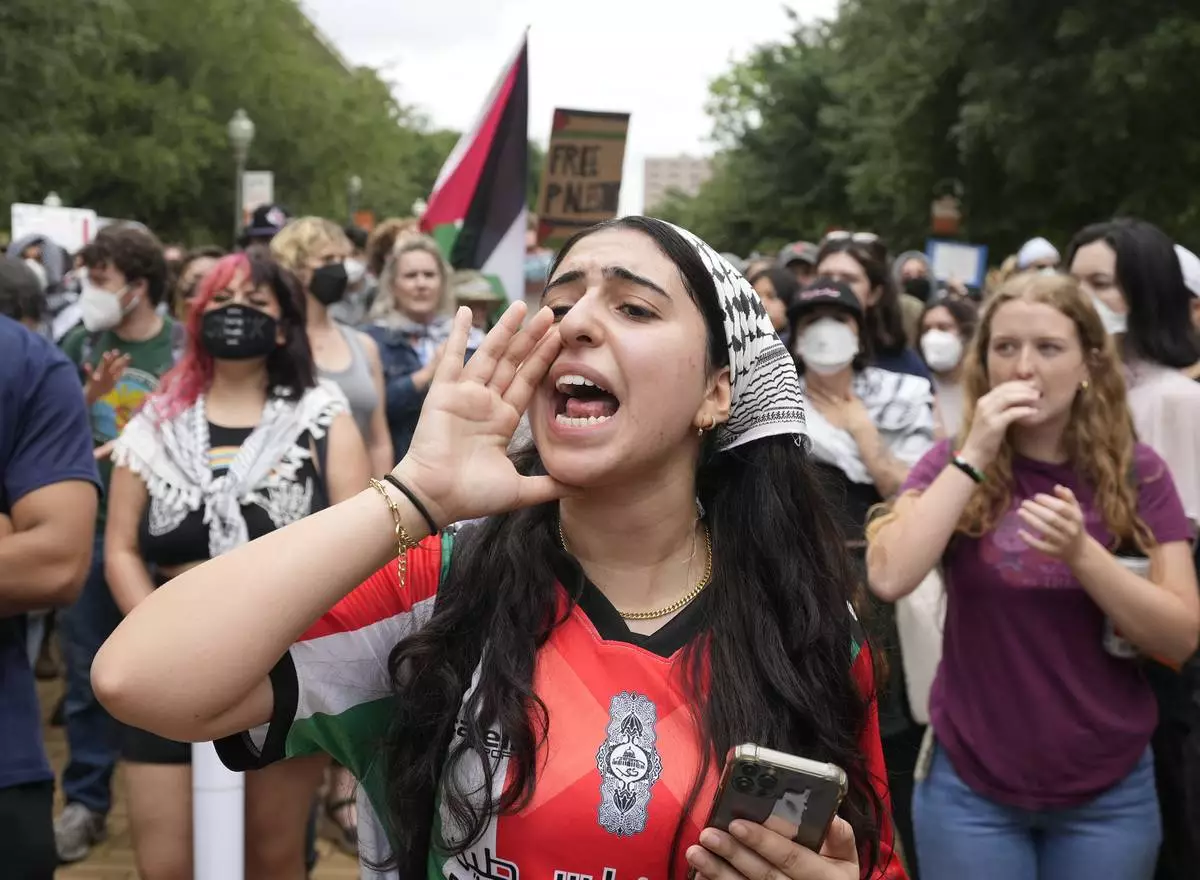
A pro-Palestinian protester, who declined to give her name, leads chants at the University of Texas, Wednesday, April 24, 2024, in Austin, Texas. (Jay Janner/Austin American-Statesman via AP)
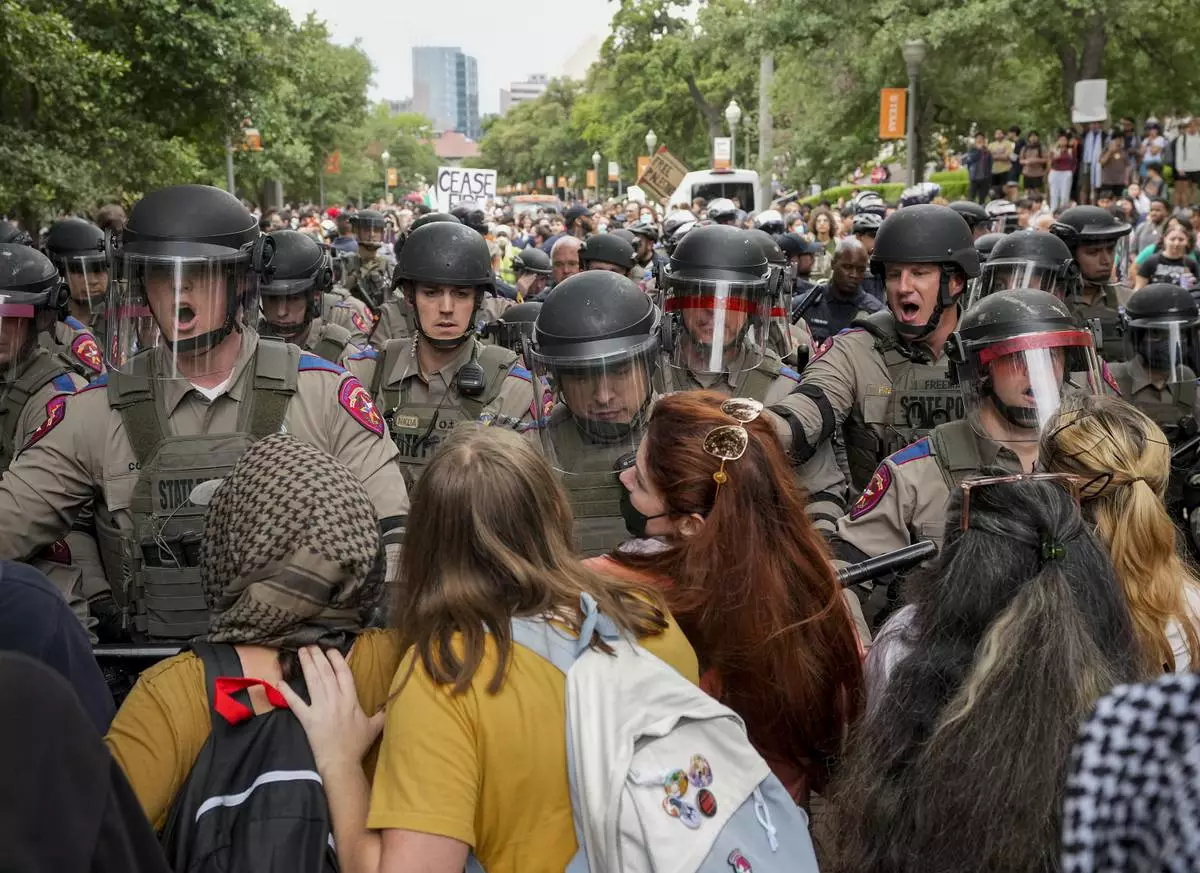
Texas state troopers in riot gear try to break up a pro-Palestinian protest at the University of Texas, Wednesday, April 24, 2024, in Austin, Texas. (Jay Janner/Austin American-Statesman via AP)
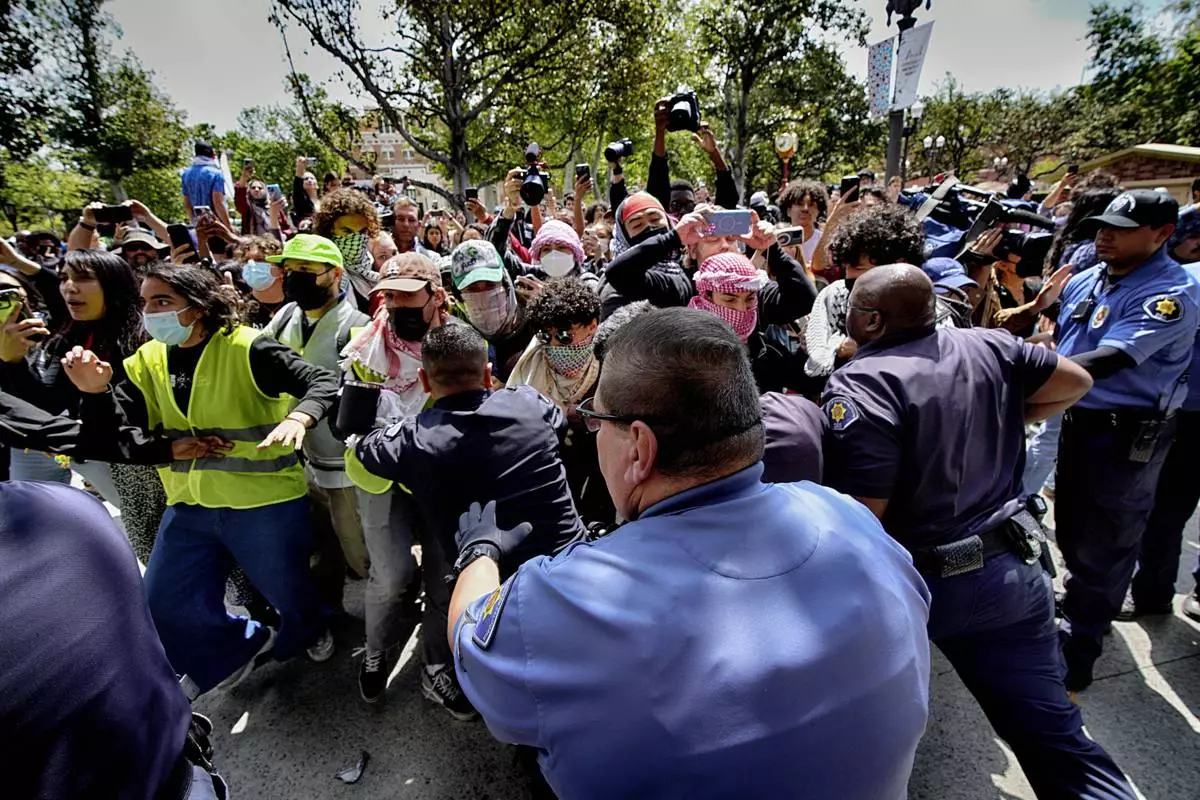
University of Southern California protesters push and shove University Public Safety officers as tempers get heated during a pro-Palestinian occupation on the University of Southern California campus Wednesday, April 24, 2024 in Los Angeles. (AP Photo/Richard Vogel)
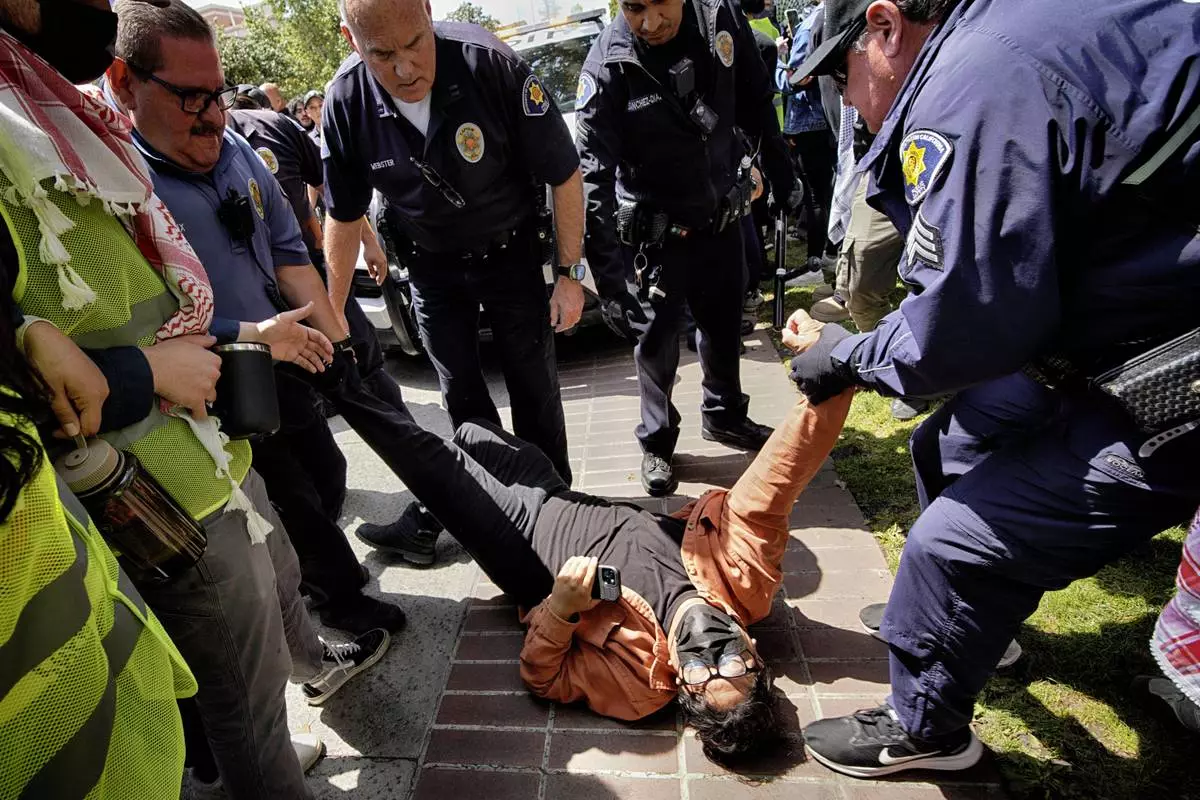
A University of Southern California protester is detained by USC Department of Public Safety officers during a pro-Palestinian occupation at the campus' Alumni Park on Wednesday, April 24, 2024 in Los Angeles. (AP Photo/Richard Vogel)
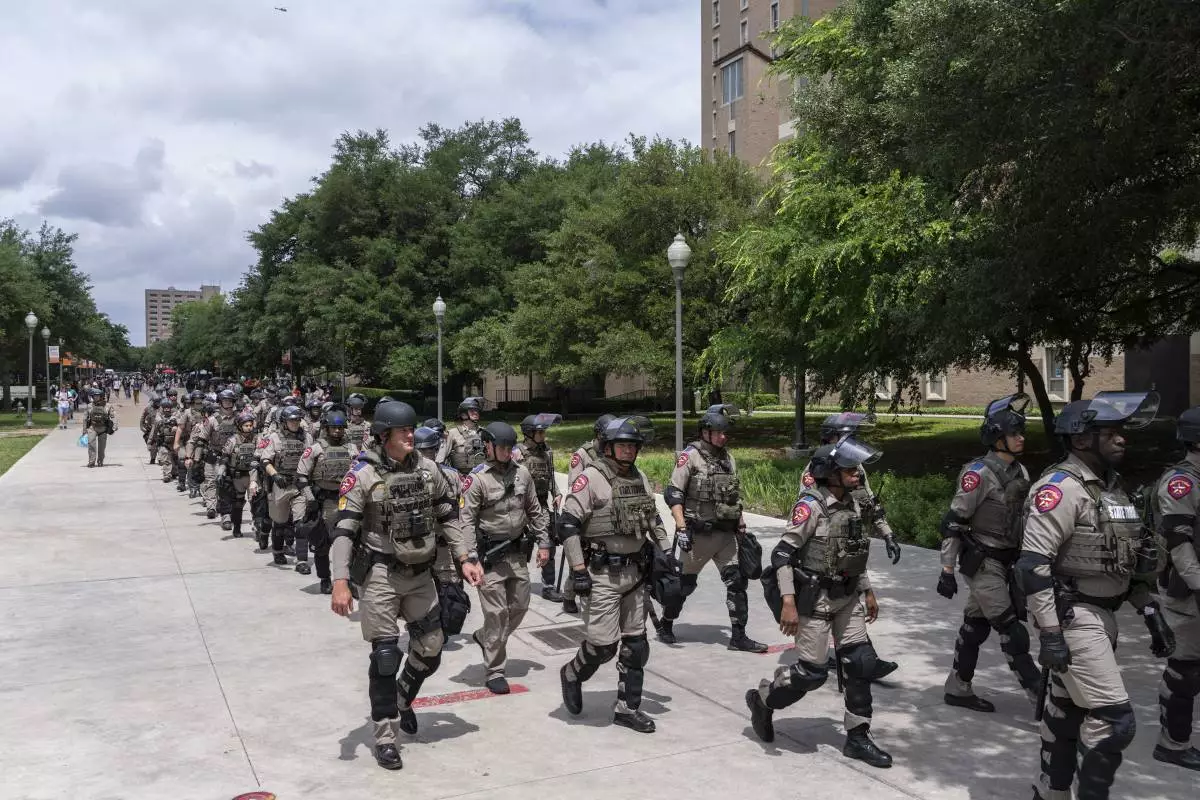
Texas state troopers march down Speedway during a pro-Palestinian protest at the University of Texas, Wednesday, April 24, 2024, in Austin, Texas. (Mikala Compton/Austin American-Statesman via AP)
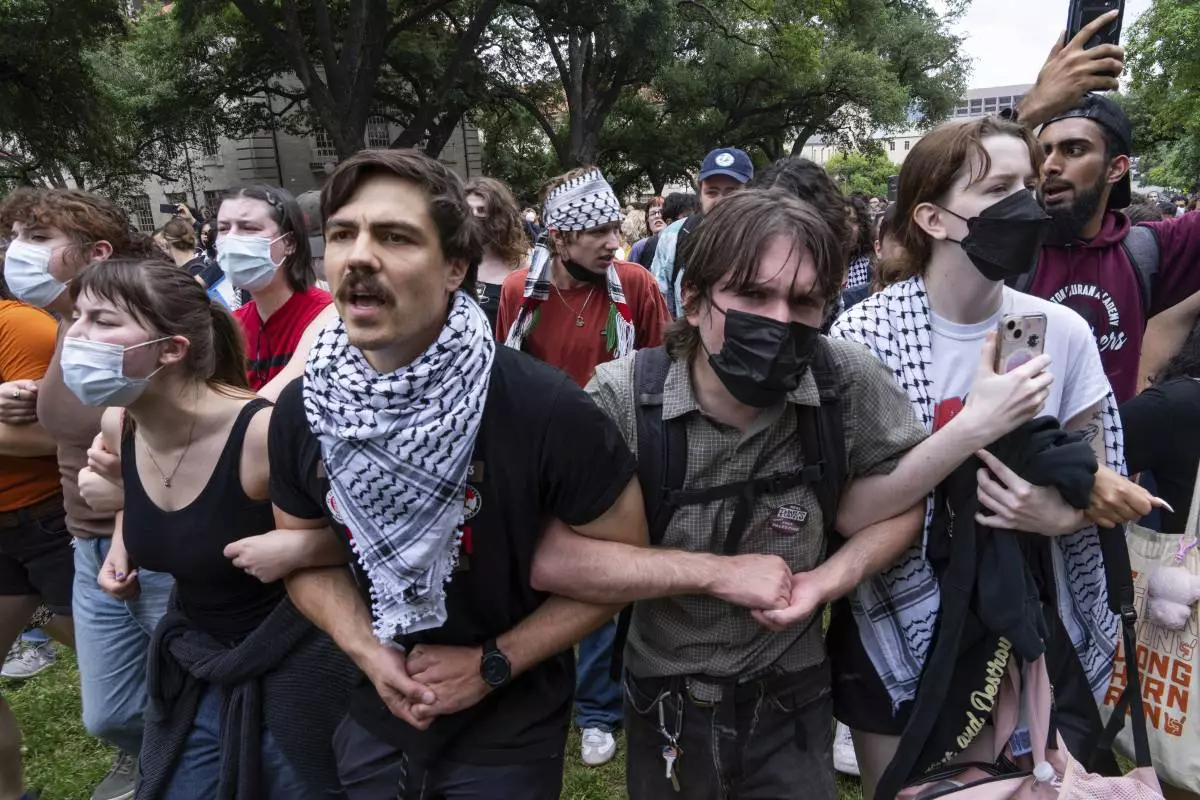
Demonstrators chant at a pro-Palestinian protest at the University of Texas, Wednesday, April 24, 2024, in Austin, Texas. (Mikala Compton/Austin American-Statesman via AP)
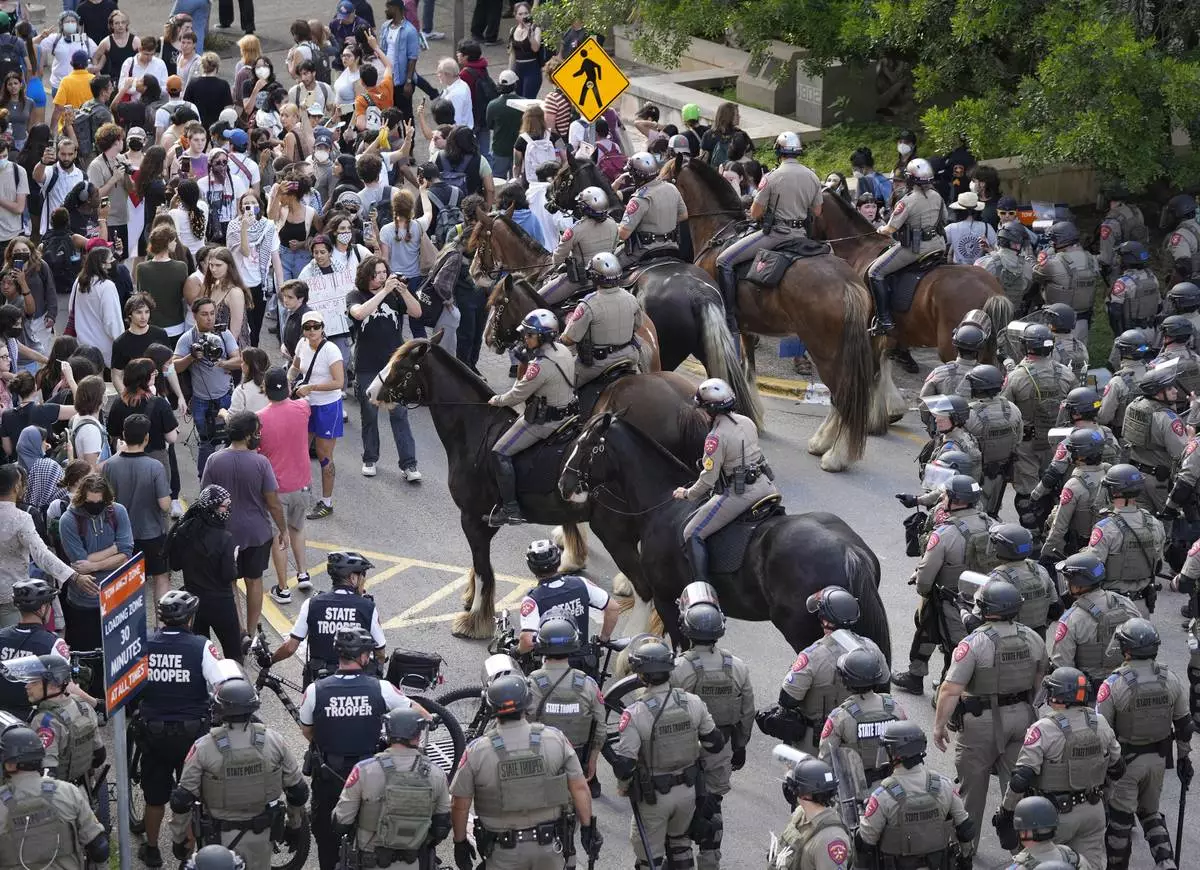
State troopers try to break up a pro-Palestinian protest at the University of Texas Wednesday April 24, 2024, in Austin, Texas. Student protests over the Israel-Hamas war have popped up on an increasing number of college campuses following last week's arrest of more than 100 demonstrators at Columbia University. (Jay Janner/Austin American-Statesman via AP)
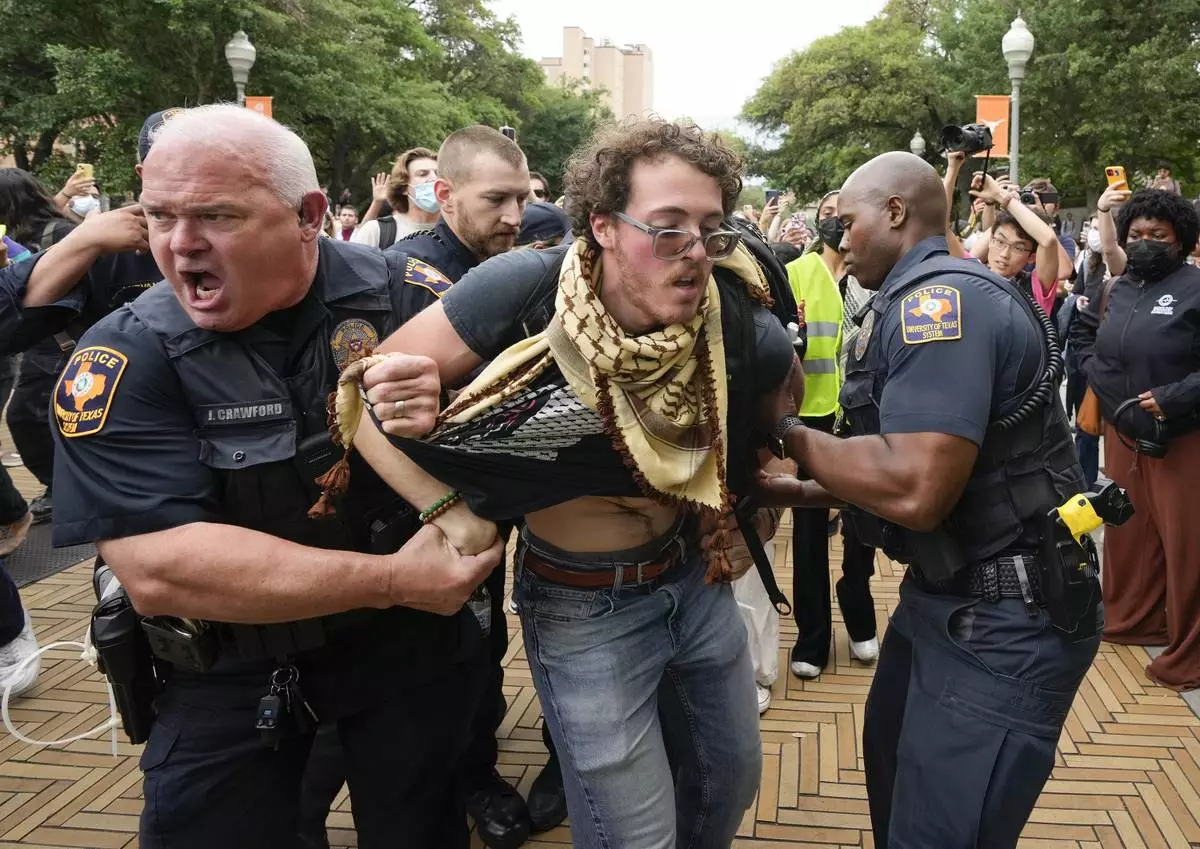
University of Texas police officers arrest a man at a pro-Palestinian protest on campus, Wednesday April 24, 2024, in Austin, Texas. (Jay Janner/Austin American-Statesman via AP)


























